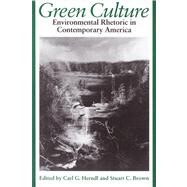Green Culture: Environmental Rhetoric in Contemporary America
, by Herndl, Carl G.- ISBN: 9780299149949 | 0299149943
- Cover: Paperback
- Copyright: 3/15/1996
Green Culture is about an idea - the environment - and how we talk about it. Is the environment something simply "out there" in the world to be found? Or is it, as this book suggests, a concept and a set of cultural values constructed by our use of language? That language, in its many forms, comes under scrutiny here, as distinguished authors writing from a variety of perspectives consider how our idea and our discussion of the environment evolve together, and how this process results in action - or inaction.
Listen to politicians, social scientists, naturalists, and economists talk about the environment, and a problem becomes clear: dramatic differences on environmental issues are embedded in dramatically different discourses. This book explores these differences and shows how an understanding of rhetoric might lead to their resolution. The authors examine specific environmental debates - over the Great Lakes and Yellowstone, a toxic waste dump in North Carolina, and an episode in Red Lodge, Montana. They look at how genres such as nature writing and specific works such as Rachel Carson's Silent Spring have influenced environmental discourse. And they investigate the impact of cultural traditions, from the landscape painting of the Hudson River School to the rhetoric of the John Birch Society, on our positions on the environment.
Most of the scholars gathered here are also hikers, canoeists, climbers, or bird watchers, and their work reflects a deep, personal interest in the natural world in connection with the human community. Concerned throughout to make the methods of rhetorical analysis perfectly clear, they offer readers a rare chance to see what, precisely, we are talking about when we talk about the environment.
Listen to politicians, social scientists, naturalists, and economists talk about the environment, and a problem becomes clear: dramatic differences on environmental issues are embedded in dramatically different discourses. This book explores these differences and shows how an understanding of rhetoric might lead to their resolution. The authors examine specific environmental debates - over the Great Lakes and Yellowstone, a toxic waste dump in North Carolina, and an episode in Red Lodge, Montana. They look at how genres such as nature writing and specific works such as Rachel Carson's Silent Spring have influenced environmental discourse. And they investigate the impact of cultural traditions, from the landscape painting of the Hudson River School to the rhetoric of the John Birch Society, on our positions on the environment.
Most of the scholars gathered here are also hikers, canoeists, climbers, or bird watchers, and their work reflects a deep, personal interest in the natural world in connection with the human community. Concerned throughout to make the methods of rhetorical analysis perfectly clear, they offer readers a rare chance to see what, precisely, we are talking about when we talk about the environment.







